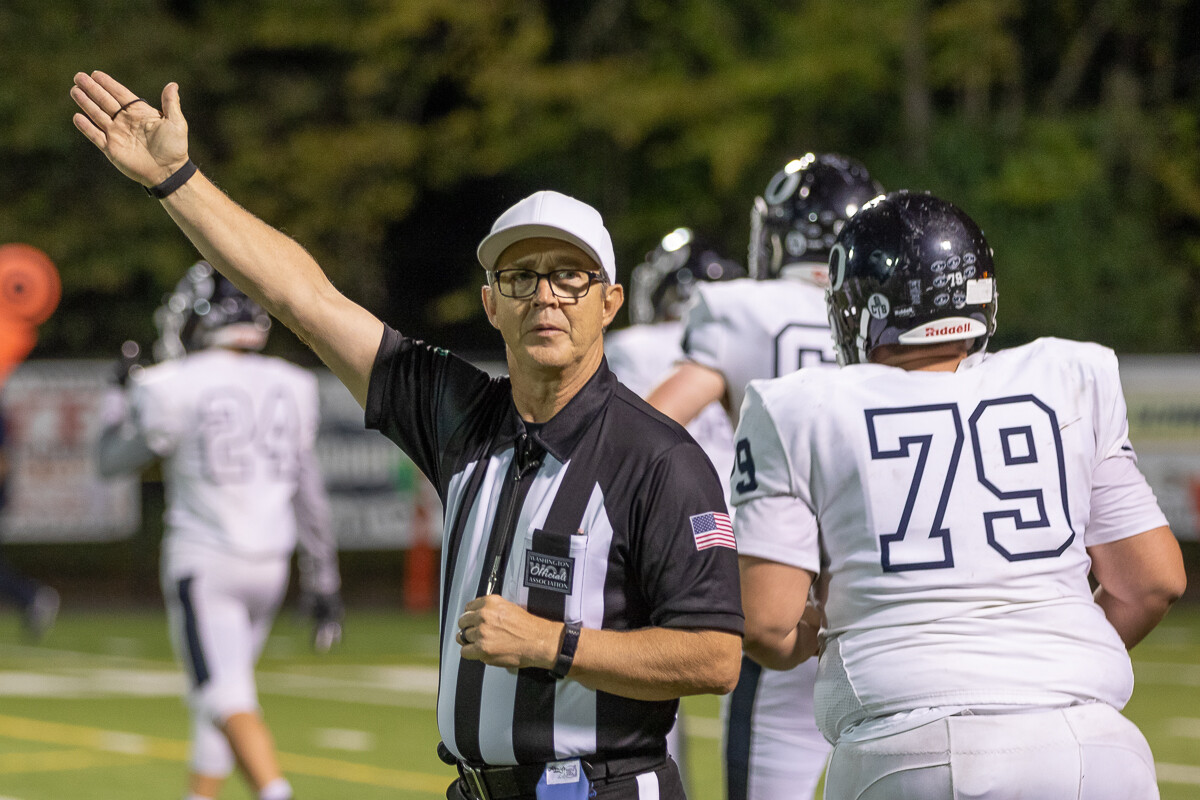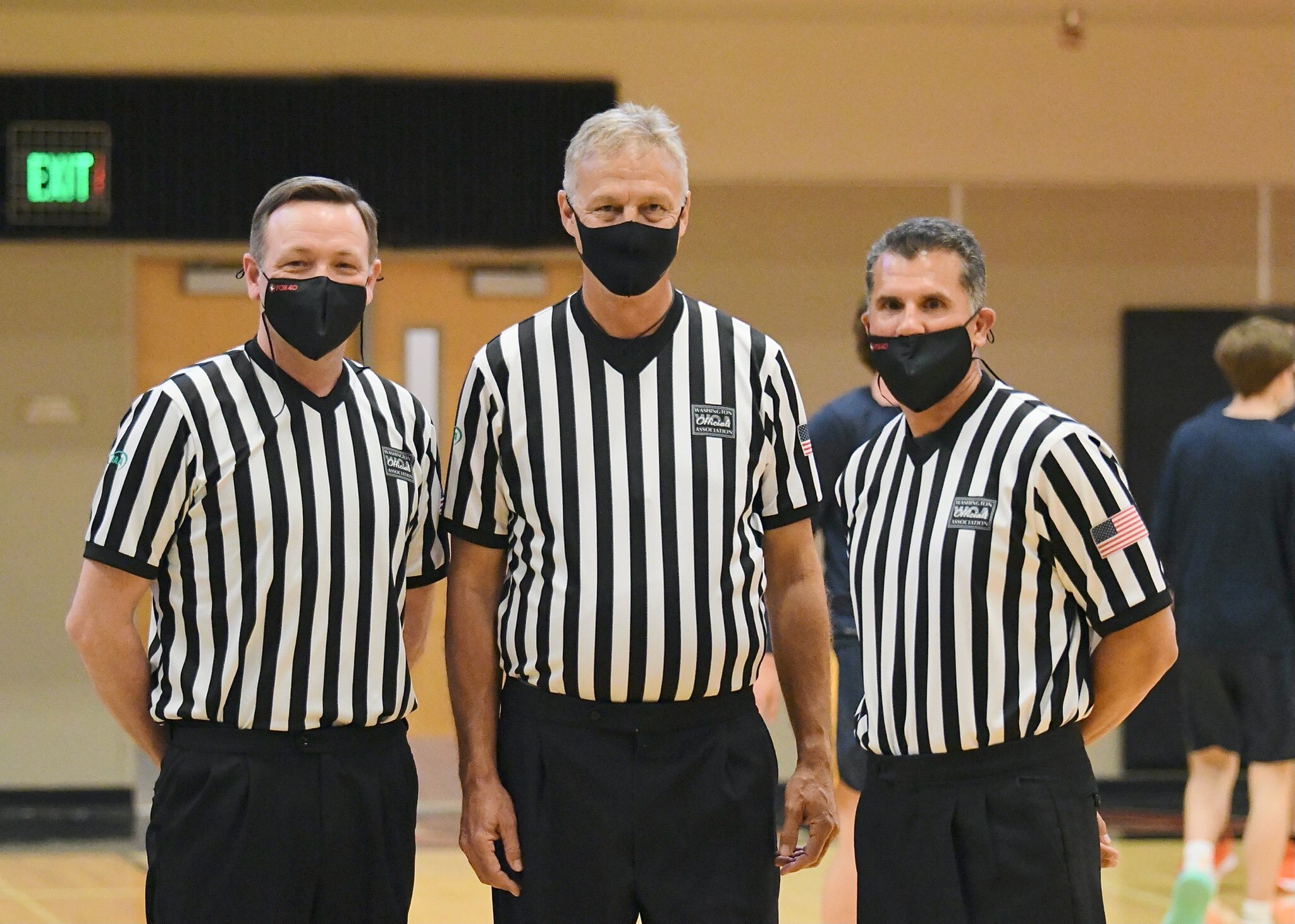Veteran officials wonder what about the future of their craft
Security found Neil Anderson during a timeout late in a state playoff basketball game, giving him some instructions.
Anderson relayed the information to his fellow game officials.
Rather than exit the court via their normal route, they were asked to go the other way. Call it a misdirection on the way to their locker room.
Security was concerned about a fan, still angered about a call made the previous day, who was waiting to confront one of Anderson’s crewmates.
“To me, that’s pretty scary,” Anderson said.
Jim Goss, a longtime football official, has had a few uneasy moments walking off the field.
“I’ve been bumped into and yelled at,” Goss said. “Accosted is maybe a better word. It’s not a fun thing.”

Mark Allen, longtime umpire and football official, remembers as a young umpire he made a call to throw out an unruly coach.
“He refused to leave. Finally left. Then came back thinking that… I didn’t have the authority to hold him responsible,” Allen said. “We forfeited the game for his team. He just went nuts. In my face, the whole walk back to my car.”
To be fair, these extreme examples, with physical contact or intimidation, occurred years ago. Still, Anderson, Goss, and Allen, who now have decades of experience in Clark County, say verbal abuse of officials continues at an alarming rate. And that abuse has affected the recruiting process for future game officials.
Dr. Karissa L. Niehoff, executive director of the National Federation of State High School Associations, penned a column last week detailing a crisis in high school sports: The declining number of officials.
Yes, she noted, the pandemic has led to a lower turnout of officials this academic year.
“For other officials, however, the pandemic was a secondary concern compared to the verbal abuse they receive from fans — mostly parents,” Niehoff wrote.
Two things need to happen in the near future, she opined: More individuals have to consider officiating high school sports. And an improvement in fan behavior so that officials will continue to officiate.
Curtis Paulson was a basketball and football official in Clark County for close to 15 years. He gave it up a few years ago, in part due to fan behavior. Many years ago, he was punched in the face by an assistant coach at a youth football game.
And he has been threatened “many, many instances,” he said.
Paulson noted that there was one game, a fan told him he would meet him in the parking lot.
“I didn’t want to go to my rig because I didn’t want him to see what I drove,” Paulson said.
At least Paulson gave officiating a good run.
There are fewer and fewer signing up to try.
Around Clark County, there is an age gap in the officiating ranks. Allen said he believes there is one member of the Evergreen Baseball Umpires Association who is in his early 20. Allen, at 41, said he thinks he might be the second-youngest member of the association.
Anderson, who also officiates soccer, is 63. At a soccer match earlier this year, he was the youngest member of a three-man crew.
“Senior guys like me, you can abuse us. We ain’t leaving,” Anderson said. “It’s the young people who are coming up, though.”
He noted that his son Jordan took a break for a couple of years after he first started. He told his dad it just wasn’t worth it.
“The (stuff) you have to take? He sat out for a couple of years,” Anderson said.
At least Jordan returned.
Many give it a try, get berated, and never come back to the court or the field.
“I know that we’ve had guys who have spent a year or two with us who are no longer with us because of these situations,” Allen said. “They are learning the game and how to umpire, and they took so much crap. Fans would stop them in the parking lot to tell them they did a horrible job. ‘Is it really worth it, getting yelled out constantly because I had a brain fart and called a strike at somebody’s shoulders?’ Plenty of guys say, ‘That’s not worth it.’”
Over the years, what used to be just anger directed at officials at the sporting event has made its way to social media. Some, still upset, have called for officials to be fired because of missed calls, perceived or real.
“Fire us? OK, who’s going to do it?” Goss asked.
It’s not like there is a line of qualified, experienced people waiting to officiate.
Goss said it took him six years of working as a football official before he got his first high school varsity game to work.
“Now, if you can read a rule book, you’re getting a varsity game the first year,” Goss said.

Allen wondered: If officials are to be fired for a missed call, should athletes be kicked off teams for making a mistake?
“We are the only profession that is expected to be 100 percent correct,” Allen said.
With more than 20 years of experience, Allen understands that receiving criticism is part of the job.
“I know no matter what call I make, I’m ticking half the people off. I have thick skin on some things. I try to tune the fans out,” Allen said.
That is more difficult for the new umpires.
“I can totally see how younger guys can hear the fans talk, (saying) we totally screwed a team,” Allen said.
There is a line that is getting crossed too often these days, the officials say. All officials understand a quick, emotional response to a call.
“To me, as long as fans don’t make it personal, I don’t have a problem,” Anderson said.
Allen notes, however, that it seems more and more that if one makes a call against someone’s son, then that official is out to get the player.
That is questioning a person’s integrity.
“As an official, you know you’re going to get some yelling,” Goss said. “It doesn’t affect me. But I know it does affect some people.”
Goss said he gets fired up, though, when a coach or a fan calls him biased. That is going overboard.
“People need to understand. We are doing the best we can,” Goss said. “We all take pride in what we do.”
Niehoff wrote that according to the National Association of Sports Officials, registration of officials across the country is down 30 percent this year. Yes, a lot of that is due to the pandemic. But some must be attributed to the abuse of officials because the officiating ranks were falling in the years prior to the pandemic, as well.
So how did Anderson become an official? Well, by yelling at an official.
“Somebody told me ‘Instead of complaining, why not help them? Become one.’ That’s not a bad idea,” Anderson said.
The pay varies depending on sport and level of competition. No one at the high school level is only officiating as a full-time job.
“It is still a decent second income,” Anderson said. “Any official who says they don’t do it for the money is lying. They wouldn’t do it for free. But I do it for the love of the game.”
Goss still enjoys the interaction with the athletes and the coaches. He focuses on the positive.
“Once you step on the field and you bring the captains out, it is the funnest thing I do,” Goss said. “It’s incredible.”
Still, with 32 years of experience, he knows his days as a football official are numbered. But he cannot leave just yet.
“Part of me would like to retire. But it would be a loss to our association if I quit,” Goss said. “I put my life into it, and I can’t leave until it’s in a better place.”
Officiating will be in a better place when more join the officiating ranks.
A correction in behavior toward officials could go a long way toward achieving that goal.
(Note: Every local association has its own application process to start training to become an official. The NFHS has put together a site to get one started. Fill out the information, the sport or sports you are interested in, and where you live, and the NFHS will get you in touch with the association. Go to: www.highschoolofficials.com)




